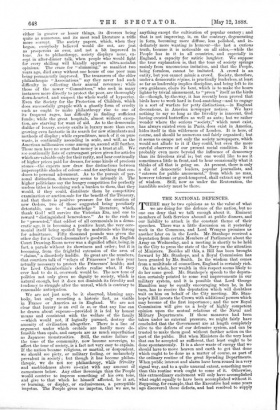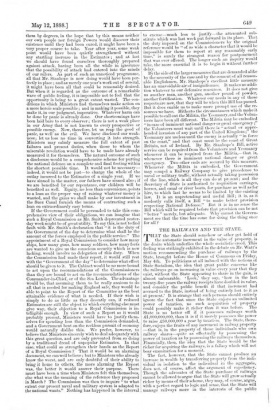THE NATIONAL DEFENCES. T HERE may be two opinions as to
the value of what we are doing for the defence of the nation, but no one can deny that we talk enough about it. Eminent members of both Services abound at public dinners, and our liability to attack is the constant theme of their speeches. There was a little discussion on it yesterday week in the Commons, and Lord Wemyss promises us another later on in the Lords. Mr. Stanhope received a deputation from certain Members of Parliament about the Army on Wednesday, and a meeting is shortly to be held in the City to press the state of the Navy on the attention of Ministers. Besides all this, a Bill has been brought forward by Mr. Stanhope, and a Royal Commission has been granted by Mr. Smith. In the wisdom that comes from a multitude of counsellors, England is certainly rich.
On the whole, her wealth in this respect seems likely to do her some good. Mr. Stanhope's speech to the deputa- tion certainly pointed to some real improvements in our military system, and it is possible that Lord George Hamilton may be equally encouraging when he, in his turn, has to receive the deputation which will doubtless wait on him on behalf of the City meeting. Mr. Stan- hope's Bill invests the Crown with additional powers which may become of the first importance ; and the new Royal Commission will give us a body of highly competent opinion upon the mutual relations of the Naval and Military Departments. If these measures had been taken under no external pressure, we might fairly have concluded that the Government are at length completely alive to the defects of our defensive system, and can be trusted to make them good without further action on the part of the public. But when Ministers do the very least that can be accepted as sufficient, that least ought to be done spontaneously. It is a sheer waste of energy that we should have to move heaven and earth to get that done which ought to be done as a matter of course, as part of the ordinary routine of the great Spending Departments. When public interest and alarm have been roused in a very signal way, and to a quite unusual extent, something more than this routine work ought to come of it. Otherwise, this extraordinary excitement will only have accomplished what ought equally to have been accomplished without it. Supposing, for example, that the Executive had some years ago discovered these defects, and had resolved to supply them by degrees, in the hope that by this means neither our own people nor foreign Powers would discover their existence until they had been cured, it might have been a very proper course to take. Year after year, some weak point would have been quietly strengthened without any startling increase in the Estimates ; and at last we should have found ourselves thoroughly prepared against attack, having been all the while in ignorance that the possibility of attack had entered into the minds of our rulers. As part of such an unnoticed programme, all that Mr. Stanhope is now doing would have been per- fectly in place ; and as merely one year's work out of several, it might have been all that could be reasonably desired. But when it is regarded as the outcome of a remarkable wave of public feeling, it is impossible not to feel that the opportunity is being to a great extent wasted. The con- ditions in which Ministers find themselves make action on a more heroic scale possible ; and in making it possible, they make it, in our judgment, imperative. Whatever harm can be done by panic is already done. Our shortcomings have been laid bare to every observer ; there is not a weak place in our Army that is not known to every prospective or possible enemy. Now, therefore, let us reap the good of panic, as well as the evil. We have disclosed our weak- ness; let us lose no time in converting it into strength. Ministers may calmly measure the full extent of past failures and present duties, when those to -whom the miserable revelation would have to be made have already measured it for themselves. The natural outcome of such a disclosure would be a comprehensive scheme for putting the national defence on a complete and final footing within the shortest possible time. It would. not be necessary— indeed, it would not be just—to charge the whole of the outlay incurred to the Estimates of a single year. If we have sinned in the matter, our fathers have sinned also ; if we are benefited by our repentance, our children will be benefited as well. Equity, no less than convenience, points to a loan as the proper way of raising whatever money is wanted, and the gains we shall make by our investment in the Suez Canal furnish the means of contracting such a loan on extraordinarily easy terms. If the Government could be persuaded to take this com- prehensive view of their obligations, we can imagine that such a Royal Commission as Mr. Smith deprecated yester- day week might be of great utility. To say this, is not to find fault with Mr. Smith's declaration that "it is the duty of the Government of the day to determine what shall be the amount of the forces employed in the public service." The appointment of a Royal Commission to consider how many ships, how many guns, how many soldiers, how many forts are wanted to give us the conscious security which is now lacking, would involve no delegation of this duty. When the Commission had made their report, it would still rest with the" Government of the day" to determine what effect should be given to it. The Cabinet would be no more bound to act upon the recommendations of the Commissioners than they are bound to act on the recommendations of the Commander-in-Chief, or of the Sea Lords. The advantage would be, that assuming them to be really anxious to do all that is needed for making England safe, they would be able to point to the Report of the Committee as the best attainable evidence of what is needed. If their wish is simply to do as little as they decently can, if reduced Estimates are still the object to which everything else must give way, their objection to a Royal Commission is in- telligible enough. In view of such a Report as it would probably present, Ministers would have to justify them- selves for spending less than the Commission demanded, and a Government bent on the reckless pursuit of economy would naturally dislike this. We prefer, however, to believe that Ministers sincerely wish to deal adequately with this great question, and are only prevented from so doing by a traditional dread of unpopular Estimates. In that case, what could so strengthen their hands as the Report of a Royal Commission ? That it would be an alarming document, we can well believe ; but to Ministers who already 'mow the worst, and are only doubtful of their ability to bring it home to others, the more alarming the Report was, the better it would. answer their purpose. There must have been a time when Ministers felt this themselves, else what was the meaning of the reference they proposed in March ? The Commission was then to inquire "to what extent our present naval and military system is adapted to the national wants." Nothing has happened in the interval to excuse--much less to justify—the attenuated sub- stitute which was last week put forward in its place. That the duty imposed on the Commissioners by the original reference would be "of so wide a character that it would be impossible for them to report at any reasonably early time," is surely the strangest reason for postponement that was ever offered. The longer such an inquiry would take, the more essential it is to begin it without further delay. By the side of the larger measures that are demanded alike by the necessity of the case and by the consent of all reason- able Englishmen, Mr. Stanhope's excellent little measure has an unavoidable air of insignificance. It makes no addi- tion whatever to our defensive resources. It does not give us another man, another gun, another pound of powder, another fortification. Whatever our needs in any of these respects are now, that they will be when this Bill has passed. But it does enable us to make more prompt use of the re- sources we have. Hitherto the circumstances which make it possible to call out the Militia, the Yeomanry, and the Volun- teers have been all different. The Militia may be embodied "in case of imminent national danger or great emergency ;" the Volunteers must wait until there is "actual or appre- hended invasion of any part of the United Kingdom ;" the Yeomanry are useless until the enemy is actually "in force on the coast," and that coast must be the coast of Great Britain, not of Ireland. By Mr. Stanhope's Bill, active service can be required from the Volunteers and Yeomanry whenever it can be required from the Militia,—that is, whenever there is imminent national danger or great emergency. Two other ends are secured by this measure. Whenever the Militia is embodied, the Government may compel a Railway Company to give precedence to naval or military traffic, without actually taking possession of the line, which is all they can do at praent ; and the Secretary of State is authorised to requisition carriages, horses, and canal or river boats, for purchase as well as for hire, to which last he seems to be limited by the existing law. It is an unpretending and useful Bill ; it is, as it modestly calls itself, a Bill "to make better provision respecting National Defence." But it is in no sense the Bill which will be required before that provision can be not " better " merely, but adequate. Why cannot the Govern- ment see that the time has come for doing the thing once for all ?



































 Previous page
Previous page